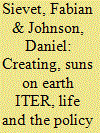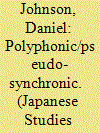|
|
|
Sort Order |
|
|
|
Items / Page
|
|
|
|
|
|
|
| Srl | Item |
| 1 |
ID:
096502


|
|
|
|
|
| Publication |
2010.
|
| Summary/Abstract |
Concerns about climate change and energy security have prompted some countries to revive dormant nuclear fission power programs to meet growing energy demands and reduce carbon dioxide emissions. However, this so-called nuclear renaissance based on fission would have major drawbacks in the areas of safety, security, and nonproliferation. Nuclear fusion, however, is portrayed by its proponents as mitigating these drawbacks, and scientists continue to pursue fusion's promise with two large-scale projects: the International Thermonuclear Experimental Reactor (ITER), and the Laser Inertial Fusion Engine (LIFE) reactor. Although supporters often hail fusion as proliferation resistant, the technology could be used to create weapons-usable fissile material. This article explains how fissile material could be created in ITER or LIFE and analyzes other nonproliferation implications of fusion; the authors discuss the various challenges faced by ITER and LIFE.
|
|
|
|
|
|
|
|
|
|
|
|
|
|
|
|
| 2 |
ID:
124533


|
|
|
|
|
| Publication |
2013.
|
| Summary/Abstract |
Nicovideo is a popular video-sharing site in Japan that incorporates several aspects of social media into its design. Key among these is the projection of user-made comments into the video display by having text scroll across the screen like an animated subtitle-track. The movement of comments across the screen and the 'pseudo-synchronicity' created by the way they are projected produces a feeling of 'live' viewing via a sense of virtual time shared between users. In this article I argue that the feeling of movement and time on the site directs users toward a certain kind of vision that, when considered alongside the modes of counter-transparent communication taken up by its user base through things like orthographic 'mistypes', is part of a shift between denotational and pictorial forms of text production that troubles the distinction between reading and other modes of vision. The article conceptualizes what kind of vision Nicovideo's interface suggests and its relationship to a distinct kind of polyphonic, anonymous communication that intersects with ideas of animation and performance. It is particularly through the intensity of textual representation that I will pursue these questions.
|
|
|
|
|
|
|
|
|
|
|
|
|
|
|
|
| 3 |
ID:
086880


|
|
|
|
|
| Publication |
2009.
|
| Summary/Abstract |
If there is one man alive who has made me ashamed as a Catholic and an Englishman, it is Bishop Richard Williamson. This is the man who declared on Swedish television: "There was not one Jew killed by the gas chambers. It was all lies, lies, lies." With his calumnies against the Jewish people, amplified by the Internet, he has reopened old wounds that had begun to heal and, in the eyes of many, has associated the Catholic Church with the vilest of all lies: Holocaust denial. How could so preposterous a personage come to obscure and temporarily even to overshadow nearly half a century of Catholic-Jewish reconciliation? Williamson belongs to the reactionary sect that calls itself the Society of Saint Pius X (SSPX). Its 400,000 members are better known as the Lefebvrists after their founder, the French Archbishop Marcel Lefebvre, who broke with the Catholic Church over the reforms of the Second Vatican Council (1962-65). The Lefebvrists are often described as "traditionalist Catholics," because they refuse to accept the vernacular Mass, which has been the ordinary form of Catholic worship since 1962, and insist on the older Latin liturgy known as the Tridentine Mass.
|
|
|
|
|
|
|
|
|
|
|
|
|
|
|
|
|
|
|
|
|